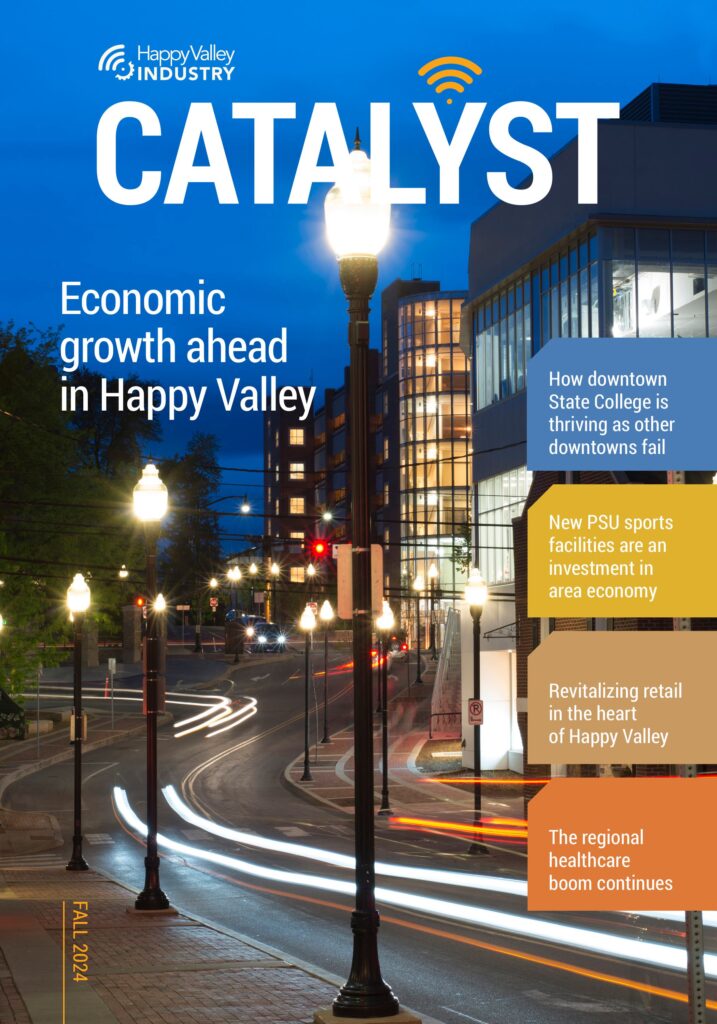How the Entrepreneurship & Innovation Minor is a game-changer for students in an AI-driven world

This article was featured in the Fall 2024 edition of Catalyst Magazine, a publication dedicated to telling compelling stories that exist in Happy Valley’s unique business ecosystem.
The future of humans in an AI-driven world will center around qualities that machines can replicate: creativity, empathy, adaptability, and the ability to execute. AI can do a lot — analyze data, generate insights, and create plans —but it can’t take action, build relationships, or innovate with a human touch. As AI takes over more routine tasks, the value of our future workforce lies in our ability to create meaning, lead with vision, and execute those plans with resilience and purpose.
Where traditional educational models often lag behind the changing demands of the modern workforce, Penn State’s Entrepreneurship and Innovation Minor is setting a new standard by offering students the chance to combine academic theory with practical, real-world applications. The program is equipping students with the entrepreneurial mindset needed to navigate a dynamic global economy where AI and automation are making rapid advancements.
“Our students are learning to be action-oriented problem solvers, ” said Ted Graef, Engineering Entrepreneurship Program director in Penn State’s School of Engineering Design and Innovation. “We like to say we’re fostering a mindset, preparing students to navigate a business world that’s innovating fast and demanding a new set of skills.”
“While the courses do provide entrepreneurial business knowledge for students seeking to start companies or be part of startups, they also cultivate an entrepreneurial mindset that complements credentials in engineering and, really any field. We are teaching the skills that today’s thriving businesses are seeking in their employees,” Graef said.
Higher education has traditionally focused on theory-heavy curricula; Penn State’s ENTI minor is flipping this model on its head. Through a combination of interdisciplinary coursework, hands-on projects, and experiential learning, the program encourages students to apply classroom knowledge to actual business, societal, and technological problems.
Courses help hone uniquely human skills like creativity, digital literacy and interdisciplinary knowledge. “Projects are designed to give students opportunities to evaluate different perspectives, make ethical decisions, and solve complex challenges through questioning and experimenting,” said Greg Woodman, Adjunct Professor of ENGR310, EntrepreneurialLeadership, a key course in the minor. “The work encourages students to think beyond conventional boundaries and bring the spark that turns ideas into new realities — something can’t do.”
“Skills like emotional intelligence — empathy, communication and collaboration — these in high demand for leadership positions in every industry, especially as AI evolves,” explained Frank Koe, teaching professor in the School of Engineering Design and Innovation.“We engage students in real-life circumstances where they learn to deal with ambiguity with adaptability and resilience.”
Finally, students in the minor learn the importance of executing, said Brad Groznik, assistant teaching professor in the program, “AI can give us strategies, but humans still need to make it happen. Execution requires resilience, hard work, and courage. Students are placed in real-world situations, learning to manage change and challenges as opportunities, not as threats.”
